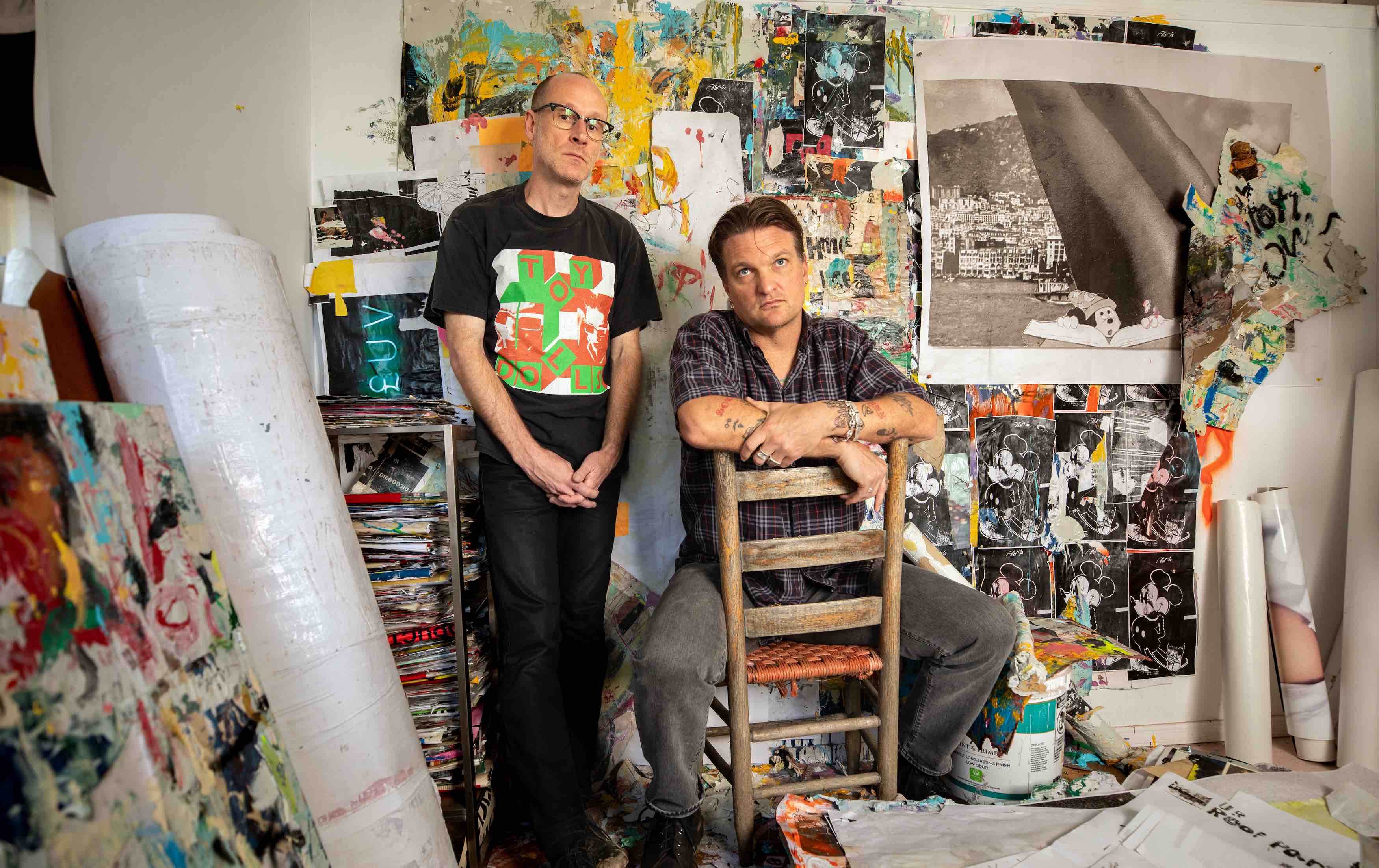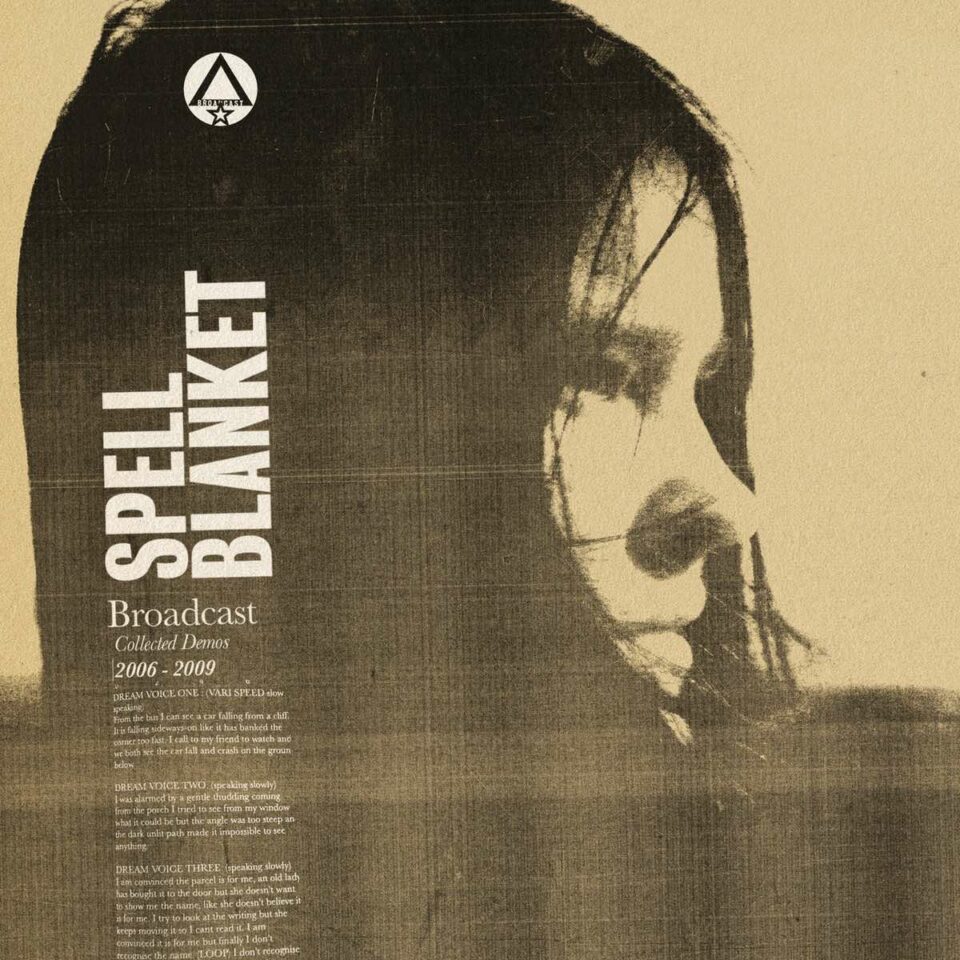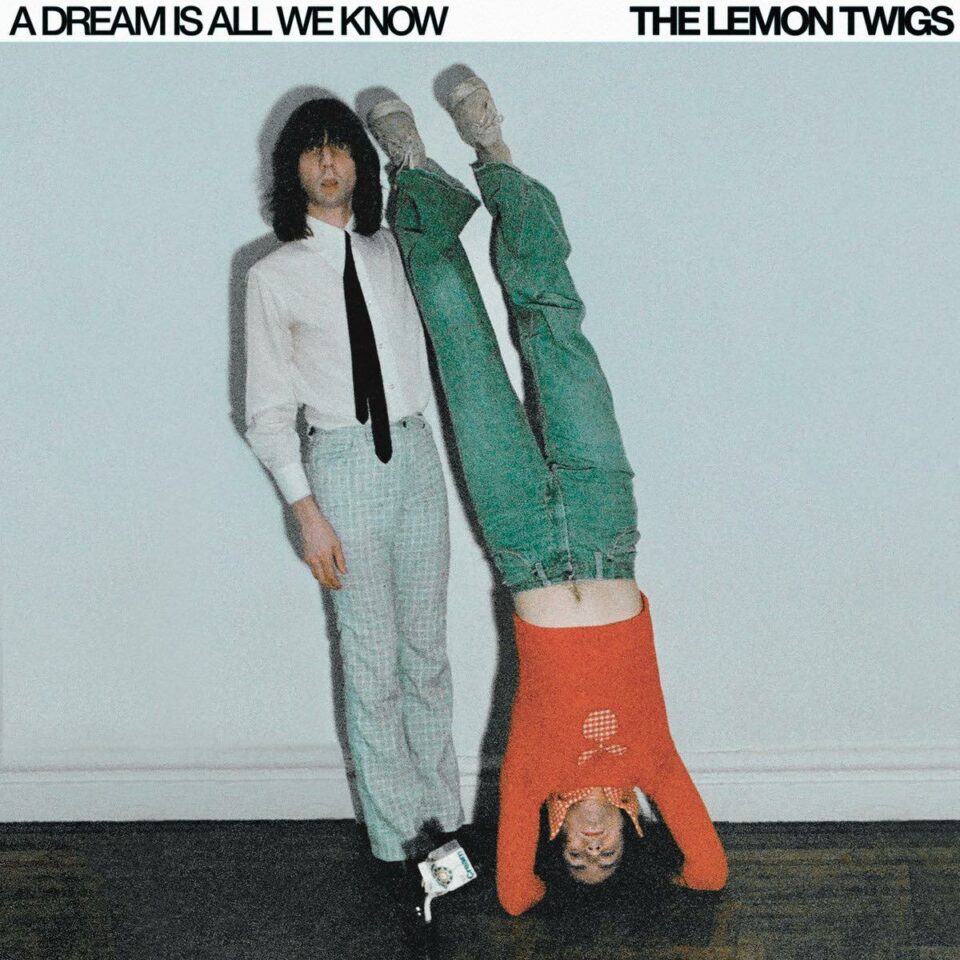At the heart of Cold War Kids are plenty of moments like this one. Singer Nathan Willett is over at the house of bassist Matt Maust in Los Angeles, and they’re in a room filled with precious cultural artifacts: books on art and music, vinyl records, framed posters on the walls. There’s a small work table piled up with the raw materials for Maust’s painting and collage-making. And Willett looks relaxed over coffee as Maust methodically pages through a stack of books on the postmodern and punk rock. If these two creative partners weren’t here to be interviewed about the band’s recent self-titled album, a vintage disc from Maust’s collection would be spinning on the turntable.
They’ve been jointly absorbing sights and sounds for inspiration since meeting as college students two decades ago, and it’s fed into the soulful, anxious songs they record together. They share many influences, which they talk about a lot more than they do their own music. “I’ll come over here and Maust is going to pull out art books and have his records playing, and we’re not going to talk about the meanings of the things we’re making. We’re more fans of other stuff,” says Willett, square-jawed with arms accented by scattered tattoos—a butterfly, boxing gloves, a cornet horn, and the words “Sing Your Life.” “You talk about the stuff that’s inspiring you.”
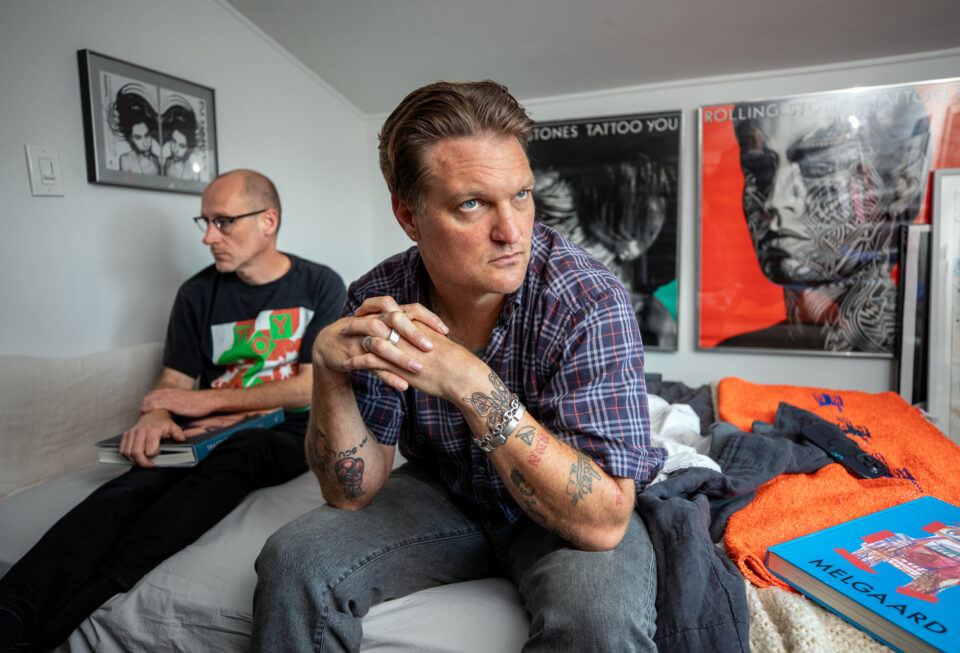
Cold War Kids band founding members Matt Maust and Nathan Willett (right) in Maust’s home in Los Angeles. The band was preparing to release a new album, “Cold War Kids,” in November 2023.
On the wall behind them are posters for exhibitions of painters Francis Bacon and Robert Rauschenberg, alongside a big pink placard from a decades-old show at the Hammersmith Apollo in London headlined by The Cramps, The Selector, Elvis Costello, The Specials, and The Pogues. Nearby, a trio of bass guitars is bunched into a corner. “If you look at enough stuff, it comes out in your own work,” says Maust, diligently poring through books on The Clash, filmmaker Wim Wenders, and artists Tracey Emin and Joseph Beuys. “Tom Waits said something I think about every day: ‘When you’re imitating your seven favorite people at the same time—badly—that’s your style.’ I love that.”
The band has been around now for 20 years, but things haven’t exactly slowed down for them, even during the COVID-19 pandemic that otherwise put the music world in limbo for over a year. Aside from completing the new album, the band is preparing for the first leg of a North American tour that begins January 31 at The Fillmore in San Francisco and ends two months later in the Southern California desert at Pappy & Harriet’s in Joshua Tree. Maust also recently had a fall solo exhibition of his mixed-media art at the Dan Yoshii Gallery in New York City.
Even before the new record, they released an energetic trilogy of albums—New Age Norms 1, 2, and 3—over three consecutive years that each clocked in at roughly 30 minutes, each composed of danceable, forward-leaning rock. Cold War Kids is their 10th studio album and it refines that sound further, opening the record with the unruly rave-up “Double Life,” with lyrics that offer a theme that repeats throughout the album. Willett documents his current duality as rock star and family man, singing urgently of the emotional whiplash of his lives at home and on the road: “Sing my songs, bang my head / Rush me home, back to bed / When you live a double life, it’s dangerous.”
“Tom Waits said something I think about every day: ‘When you’re imitating your seven favorite people at the same time—badly—that’s your style.’ I love that.” — Matt Maust
“I have three kids, three girls,” says Willett. “The lyric in the song is, ‘Now I’m a mother of three, I’m not living for myself.’ I saw that somebody commented, ‘Oh, I love you writing this from a woman’s perspective.’ When I’m home and my wife works, I’m like a mother in ways. It’s not me saying ‘I’m a woman,’ but it’s me saying there’s something rich in the soil about men having more of a feminine role in a family than ever before in history.”
With soul in his voice and a gift for hooks, Willett performs with as much Motown in the grooves as alternative rock. The album unfurls beyond “Double Life” like a well-paced concert, with a dynamic balance of dancefloor tunes (“Toxic Mask”), an aching piano ballad about breaking up with your therapist (“Another Name”), and the soaring “Starring Role,” in which Willett sings: “Please give me a character to play... It’s not enough to be myself.”
Willett and Maust are joined by the players who’ve been part of Cold War Kids for most of the past decade: guitarist David Quon, keyboardist Matthew Schwartz, and drummer Joe Plummer. “In any band or any collaboration, you’re going to find the ways that there’s still tension,” says Willett. “But if you do it long enough, you have to resolve the big tensions. We’ve gone through these lineup changes. We’ve been very fortunate to have different musicians who’ve offered so much to what Cold War Kids has been on different records. We have the tremendous fortune of having it be more fun than ever. And I just don’t see that anywhere else among our peers.”
On the new album cover is a photograph of the band’s two founding members, capturing a moment when Willett’s face is gently pressed against Maust’s cheek, looking like a whisper or a kiss. The picture is intimate, indicating an ongoing partnership built on trust and inspiration. It was shot in this same room by their friend Sean Flynn. “We’ve had this ritual for at least 10 years now: before we play a show, we all kiss each other on the cheek. It’s our version of a hug,” says Maust.
“We’ve been very fortunate to have different musicians who’ve offered so much to what Cold War Kids has been on different records. We have the tremendous fortune of having it be more fun than ever. And I just don’t see that anywhere else among our peers.” — Nathan Willett
Aside from his role in Cold War Kids, Maust has an active career as a fine artist, and his house is a monument to his obsessions in high and low art, modern rock, and the avant-garde. Upstairs are more posters framed behind museum glass and a bedroom where he keeps his massive collection of vintage T-shirts, like the Toy Dolls one he’s wearing now. And just outside is the small shack where the bassist creates his artwork. The walls are splashed with paint and the floor is covered in layers of found media, torn magazines, and pop culture ephemera that will find its way onto his canvases.
Maust picks up a vinyl copy of the band’s 2019 album New Age Norms 1, which shows one of his jagged, handmade pieces on the cover: a mix of black, white, and red ripped paper and typography. Willett nods approvingly. “That’s a good-looking cover,” the singer says. “It’s nice when you don’t see it for a while. This is why I like working the way we do. You keep putting the stuff out and try to not fixate on it so hard. You move on and then you look back and go, ‘Oh my God, that looks great—kind of forgot.’”
They’ve long been an exceptionally prolific entity. Before the newest album and the preceding trilogy, there was also a double-disc compilation record from their former label, Downtown Records, that they had little involvement in curating beyond redesigning the cover after its initial release. This Will All Blow Over in TIme included a disc of unreleased tracks, rarities, and cover songs, like their spirited take on Nick Cave’s “Opium Tea.” While fans no doubt appreciated this gathering of greatest hits and misses, Willett and Maust were less comfortable with focusing attention on the past. “The thing was, it felt like so much backward-looking,” Willett says impatiently. “It was like, we just gotta completely start new.”
“I feel like we’ve been in, like, 10 different bands in 20 years. The people and the albums are just so different, which is a good thing.” — Matt Maust
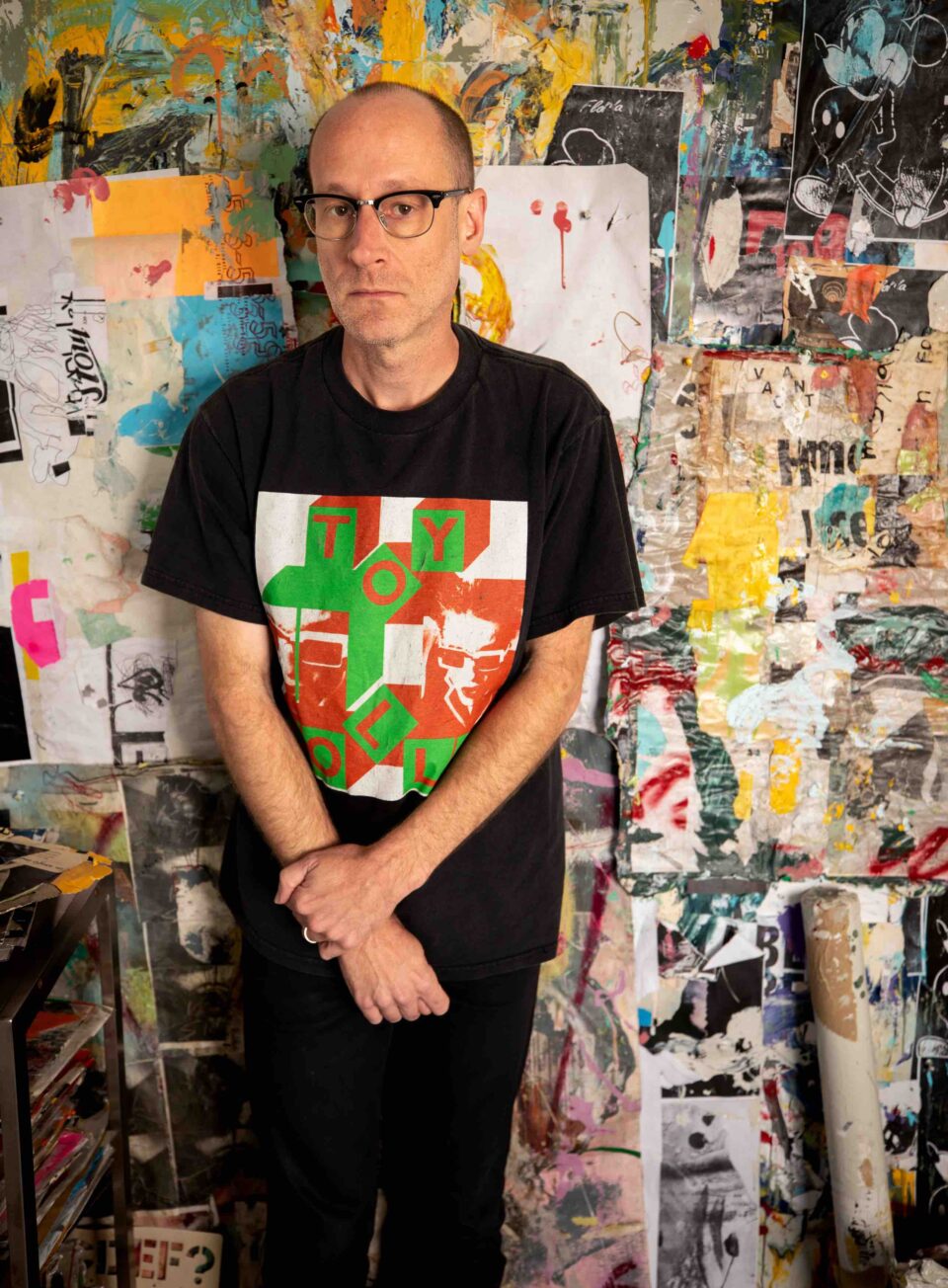
Cold War Kids band founding member Matt Maust, who is also an artist, in his art studio in Los Angeles. The bassist’s band was preparing to release a new album, “Cold War Kids,” in November 2023.
Most of the world discovered Cold War Kids through the song “Hang Me Up to Dry,” with angry lyrics written to an ex-girlfriend (now Willett’s wife of several years), sung with an edge to his voice, and with an especially angular guitar riff. The song propelled the band and their 2006 debut album Robbers & Cowards into the mainstream, but by then Cold War Kids had been playing for years. Now, suddenly, they were in demand. They were on tour in Europe when friends started emailing them with an inexplicable message: “You’re on MTV.” An even bigger hit came in 2015 with “First,” from their fifth studio album Hold My Home—another angry love song that went platinum in the US.
Then as now, Willett’s lyrics and performance straddle the line between soulful and on-edge. “I like the emotion of the songs to come first and the lyrics flow from that,” he says. The songwriter discovered his love for literature in junior college, and was a late-bloomer there. He transferred to Biola University, a private Evangelical college (originally called Bible Institute of Los Angeles) an hour southeast of Downtown LA, not expecting to meet any like-minded people—or to have many friends at all. He ended up connecting with some of the people that he remains closest to—including Maust. “I was very begrudgingly going there. My dad wanted me to go there. I was not sure about all this,” recounts Willett, whose own faith had ended during adolescence with the divorce of his parents. “It’s so strange because now our band, our manager, so much of all the influential people in my life, came from this little chunk of two years.”
At the time, Maust and Willett were actively going to rock shows in LA. The first concert they attended together was The Walkmen opening for Hot Hot Heat at the Troubadour (they left after The Walkmen were done). They had long conversations about Blur’s 13. “It was just so many things that we liked—dub things and alternative things and electronic things and rock ’n’ roll things,” says Willett, who recently shared a playlist of some of the band’s Brit-rock influences with us. “I was like, ‘I want to start a band like that.’”
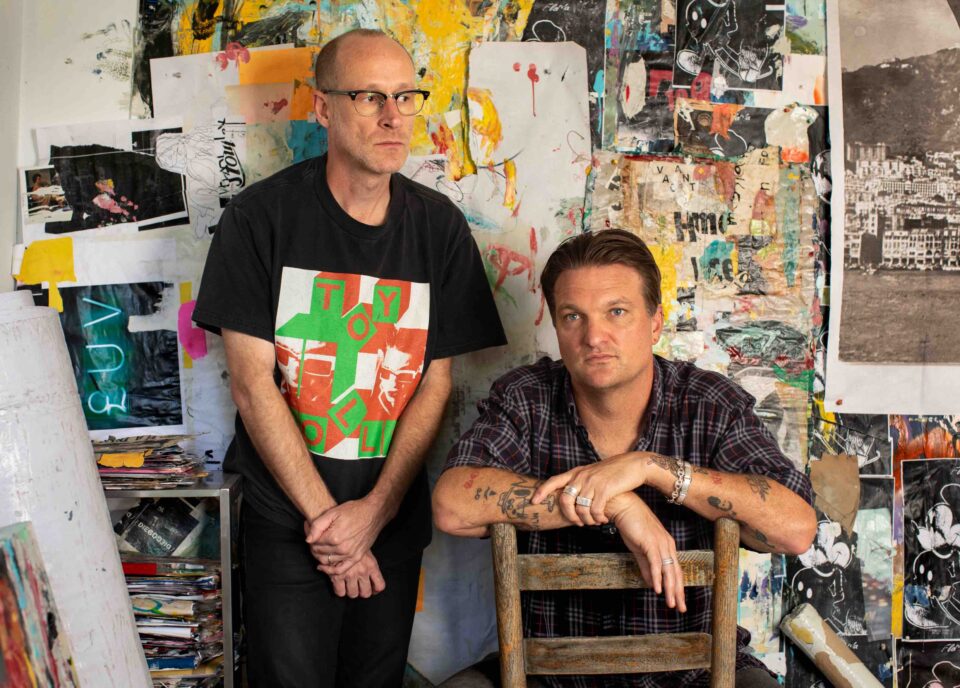
Cold War Kids band founding members Matt Maust and Nathan Willett (sitting) in Maust’s art studio in Los Angeles. The band was preparing to release a new album, “Cold War Kids,” in November 2023.
After graduating, Willett worked as a substitute teacher, and Maust was doing graphic design, and neither was satisfied. “I could see where I was going and that I didn’t want to be a public school teacher. It wasn’t the life I wanted,” Willett recalls. He decided to start a band with his friends from college. Maust played in punk bands since he was 14, but had slowly drifted away from that. At 23, he sold his bass to a student at Biola for $100. Two weeks later, the band started, and he wanted to buy it back. “She’s like, ‘No, I want it,’” he says. “I was like fuck. So annoying.”
The band worked on music for six months without a name, but Maust had already created a website that he called “Cold War Kids” as part of a web design class in the late ’90s. “It was a cool sounding motif,” he says now of the name. The site was a place to post his own art, poetry, musings, and the artwork of friends he admired. Privately, he thought it would also be a great name for the new band. “I wasn’t going to say it. I waited for them to say, ‘Hey, that’s the spirit of the band. Let’s name the band that.’”
They rose from the indie rock clubs of Orange County and Long Beach and found a frequent home at LA’s 160-capacity Silverlake Lounge, sharing a tiny stage with a rotation of acts like Vampire Weekend, Trail of Dead, and Kristin Hersh. Once Cold War Kids had hits and name-recognition, they played bigger rooms as headliners and openers. Earlier this year, they toured in support of Tears for Fears, and ended the six-week run at the Hollywood Bowl. Back in 2005, they had all snuck into that iconic concert venue to see Oasis.
“This is why I like working the way we do. You keep putting the stuff out and try to not fixate on it so hard. You move on and then you look back and go, ‘Oh my God, that looks great—kind of forgot.’” — Nathan Willett
Weeks after talking at Maust’s house, Cold War Kids are playing a special daytime show at the Permanent Records Roadhouse to close out 2023, an intimate LA music venue and bar attached to a record store. It’s a short, mostly acoustic set played in celebration of the new album, and serves as a preview of the headlining tour to come. The band is on a small stage between racks of vinyl, and at the center are Maust and Willett, who strums an acoustic guitar and wails songs old and new. Even in this quieter mode, there’s a recognizable feeling of impatience in the vocals, of words tumbling forward, demanding to be understood. Fans crowded up front cheer when the singer reaches back to 2017 and the song “So Tied Up,” singing: “I told you the truth about the old me / And now you use confession as the proof… We’ve been here before / You want something more.”
Past or present, the songs of Cold War Kids emerge from a consistent voice at the band’s center, while the sounds and players evolve around Willett and Maust through time. Back at his house, Maust explained: “I feel like we’ve been in, like, 10 different bands in 20 years. The people and the albums are just so different, which is a good thing. I love how every time we do a new record, it makes the old songs come to life in a different way.” FL

